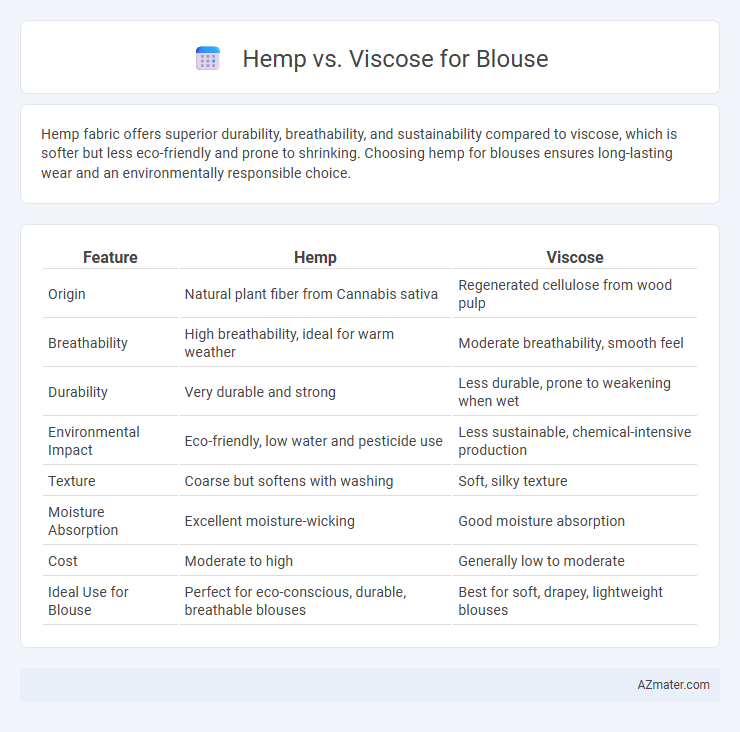Hemp fabric offers superior durability, breathability, and sustainability compared to viscose, which is softer but less eco-friendly and prone to shrinking. Choosing hemp for blouses ensures long-lasting wear and an environmentally responsible choice.
Table of Comparison
| Feature | Hemp | Viscose |
|---|---|---|
| Origin | Natural plant fiber from Cannabis sativa | Regenerated cellulose from wood pulp |
| Breathability | High breathability, ideal for warm weather | Moderate breathability, smooth feel |
| Durability | Very durable and strong | Less durable, prone to weakening when wet |
| Environmental Impact | Eco-friendly, low water and pesticide use | Less sustainable, chemical-intensive production |
| Texture | Coarse but softens with washing | Soft, silky texture |
| Moisture Absorption | Excellent moisture-wicking | Good moisture absorption |
| Cost | Moderate to high | Generally low to moderate |
| Ideal Use for Blouse | Perfect for eco-conscious, durable, breathable blouses | Best for soft, drapey, lightweight blouses |
Introduction: Hemp vs Viscose Blouses
Hemp blouses offer exceptional durability, breathability, and sustainability due to their natural fibers and low environmental impact. Viscose blouses provide a smooth, silky texture with good drape and vibrant color retention but involve more intensive chemical processing. Choosing between hemp and viscose depends on prioritizing eco-friendliness and longevity versus softness and aesthetic appeal.
Sustainability Comparison: Hemp and Viscose
Hemp fabric is highly sustainable, requiring minimal water, pesticides, and synthetic fertilizers, and it naturally replenishes soil nutrients through crop rotation. Viscose production relies heavily on chemically intensive processes and significant water consumption, often sourced from wood pulp that contributes to deforestation and habitat loss. Choosing hemp over viscose for blouses significantly reduces environmental impact by promoting biodegradability, renewable cultivation, and lower carbon emissions.
Fabric Source and Production Process
Hemp fabric is derived from the fibers of the Cannabis sativa plant, known for its rapid growth and minimal need for pesticides, making it a sustainable textile option. Viscose, on the other hand, is a semi-synthetic fiber produced from chemically treated wood pulp, typically from beech, birch, or eucalyptus trees, involving energy-intensive processes and toxic chemicals like carbon disulfide. While hemp offers a natural and eco-friendly production process with low environmental impact, viscose production raises concerns due to deforestation and chemical pollution in manufacturing.
Environmental Impact of Hemp and Viscose
Hemp cultivation requires significantly less water and pesticides compared to viscose production, making it a more sustainable choice for blouses. Viscose manufacturing involves chemically intensive processes that release toxic emissions and consume large amounts of energy, contributing to environmental pollution. Hemp fibers are biodegradable and improve soil health, whereas viscose is typically sourced from wood pulp leading to deforestation concerns.
Breathability and Comfort in Blouses
Hemp fabric offers superior breathability compared to viscose, making it ideal for blouses worn in warm climates due to its natural moisture-wicking properties and durability. Viscose, while soft and comfortable against the skin, tends to retain heat and moisture, resulting in less effective ventilation. Choosing hemp for blouses enhances airflow and keeps the wearer cooler and more comfortable throughout the day.
Durability and Longevity
Hemp fabric offers superior durability and longevity compared to viscose, as it is naturally resistant to wear and tear due to its strong fiber structure. Hemp fibers maintain their strength even after multiple washes, ensuring blouses retain shape and appearance over time. Viscose, while soft and breathable, tends to weaken and lose durability with frequent laundering, making it less ideal for long-lasting blouse wear.
Cost and Affordability
Hemp fabric offers a sustainable and durable option for blouses, typically priced moderately due to eco-friendly cultivation and minimal processing costs. Viscose, derived from wood pulp, generally costs less to produce but involves chemical-intensive manufacturing, impacting final retail prices and environmental considerations. Consumers seeking affordability with environmental benefits often weigh hemp's long-term value against viscose's lower upfront cost.
Style, Texture, and Appearance
Hemp fabric offers a natural, slightly coarse texture that gives blouses a rustic, eco-friendly aesthetic with excellent durability and breathability ideal for casual or bohemian styles. In contrast, viscose provides a smooth, silky texture with a lustrous appearance, lending blouses a soft drape and vibrant color intensity suitable for elegant and formal wear. Choosing between hemp and viscose blouses depends on prioritizing sustainability and texture roughness versus luxurious feel and refined style.
Care and Maintenance Requirements
Hemp fabric is durable, breathable, and requires minimal care, often only needing cold water washing and air drying to prevent shrinkage and maintain fiber strength. Viscose, being more delicate, demands gentle handling with hand washing or machine washing on a delicate cycle in cold water, and must be air dried to avoid fabric damage and shrinking. Both fabrics benefit from avoiding bleach and high heat, but hemp's resilience makes it a lower-maintenance option for long-term garment care.
Choosing the Best Fabric for Your Blouse
Hemp fabric offers superior breathability, durability, and eco-friendliness, making it an excellent choice for blouses that require natural fiber comfort and long-lasting wear. Viscose provides a silky texture and vibrant drape, ideal for stylish blouses but often lacks the sustainability and strength of hemp. For optimal blouse fabric selection, prioritize hemp for sustainability and robustness, or viscose for softness and elegance based on your style and environmental preferences.

Infographic: Hemp vs Viscose for Blouse
 azmater.com
azmater.com